In loving memory of our friend James Randi who passed away at the age of 92 on October 20, 2020 we present a classic lecture on skepticism given at Caltech by James Randi on March 22, 1992 at the inaugural session of the Distinguished Science Lecture Series hosted by Michael Shermer and presented by The Skeptics Society in California (1992–2015). With wit and wonderfully illustrative examples, Randi teaches us several lessons on the scientific investigation of unusual claims.
Tags
-
browse by topic
belief
James Randi in Memoriam, 1928–2020
A Report from the Paranormal Trenches
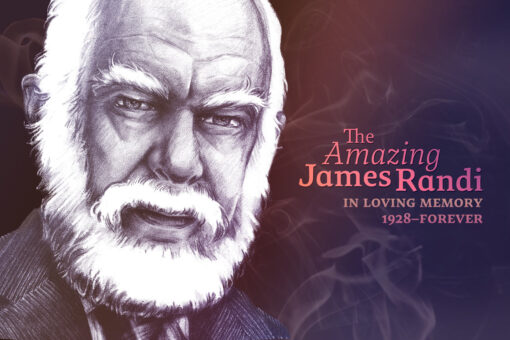
A classic lecture on skepticism was given by James Randi on March 22, 1992 at the inaugural session of the Distinguished Science Lecture Series hosted by Michael Shermer and presented by The Skeptics Society in California (1992–2015). With wit and wonderfully illustrative examples, Randi teaches us several lessons on the scientific investigation of unusual claims.
Why People Believe Conspiracy Theories
What is a conspiracy, and how does it differ from a conspiracy theory? Michael Shermer explains who believes conspiracy theories and why they believe them in the following essay, derived from Lecture 1 of his 12-lecture Audible Original course titled “Conspiracies and Conspiracy Theories: What We Should Believe and Why.”
eSkeptic for July 17, 2020
Dr. Anondah Saide and Dr. Kevin McCaffree examine whether political party identification is associated with tolerant attitudes towards individuals with different political views. ALSO, Michael Shermer explains who believes conspiracy theories and why they believe them in an essay derived from a lecture on conspiracies and conspiracy theories.
David J. Halperin — Intimate Alien: The Hidden Story of the UFO
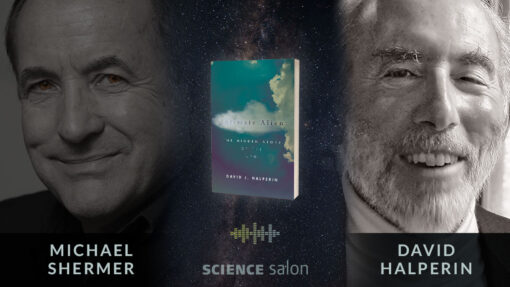
In Science Salon # 124 Michael Shermer speaks with David J. Halperin about what our fascination with UFOs tells us about ourselves as individuals, as a culture, and as a species.
eSkeptic for July 14, 2020
In Science Salon # 124 Michael Shermer speaks with David J. Halperin about what our fascination with UFOs tells us about ourselves as individuals, as a culture, and as a species.
Why We Are Living in a Post-Truth Era

Are we living in a Post-Truth era of fake news and alternative facts? Dr. Lee McIntyre avers that we must take seriously the threat to truth posed both by those who would subvert the truth for political gain, and also by those who would deny that such a threat actually exists.
What are Science & Skepticism?
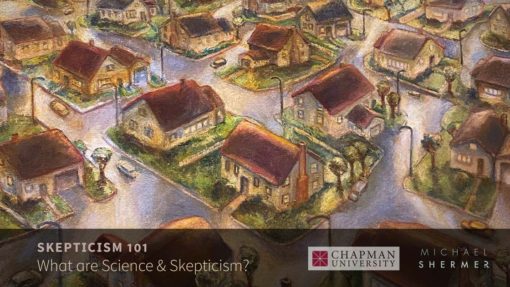
In this lecture, Dr. Michael Shermer presents descriptions of skepticism and science and how they work, along with a discussion of the difference between science and pseudoscience, and some very practical applications of how to test claims and evaluate evidence.
eSkeptic for June 12, 2020
In this lecture, Dr. Michael Shermer presents descriptions of skepticism and science and how they work, along with a discussion of the difference between science and pseudoscience, and some very practical applications of how to test claims and evaluate evidence.
eSkeptic for May 29, 2020
In this lecture on Evolution and Creationism (Part 1), Dr. Michael Shermer takes viewers to the Galápagos Islands to retrace Darwin’s footsteps and show that, in fact, Darwin did not discover natural selection when he was there in September of 1835. He worked out his theory when he returned home, and Shermer shows exactly how Darwin did that, along with the story of the theory’s co-discoverer, Alfred Russel Wallace.
Evolution & Creationism, Part 1
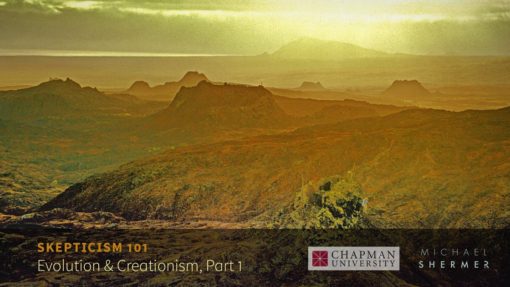
In this lecture on Evolution and Creationism (Part 1), Dr. Michael Shermer takes viewers to the Galápagos Islands to retrace Darwin’s footsteps and show that, in fact, Darwin did not discover natural selection when he was there in September of 1835. He worked out his theory when he returned home, and Shermer shows exactly how Darwin did that, along with the story of the theory’s co-discoverer, Alfred Russel Wallace.
eSkeptic for April 21, 2020
In Science Salon # 112 Michael Shermer speaks with Ann Druyan about her book Cosmos: Possible Worlds, exploring how science and civilization grew up together. This book is the sequel to Carl Sagan‘s beloved classic and the companion to the hit television series hosted by Neil deGrasse Tyson.
Ann Druyan — Cosmos: Possible Worlds
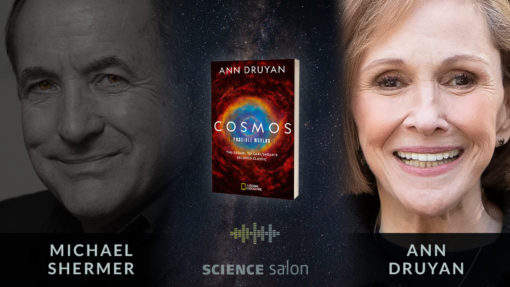
In this sequel to Carl Sagan’s beloved classic and the companion to the hit television series hosted by Neil deGrasse Tyson, the primary author of all the scripts for both this season and the previous season of Cosmos, Ann Druyan explores how science and civilization grew up together. From the emergence of life at deep-sea vents to solar-powered starships sailing through the galaxy, from the Big Bang to the intricacies of intelligence in many life forms…
Cults, Myths, and Religion
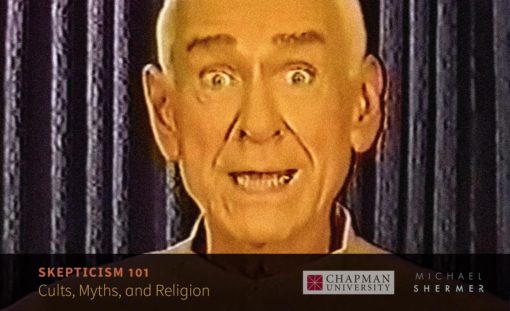
Dr. Michael Shermer considers the characteristics of cults, how they differ from sects, religions, and myths, the role that myths and religions play in culture and people’s lives, and what Scientologists really believe.
eSkeptic for April 3, 2020
Dr. Michael Shermer considers the characteristics of cults, how they differ from sects, religions, and myths, the role that myths and religions play in culture and people’s lives, and what Scientologists really believe.
Is a Good God Logically Possible?

In this excerpt from his book Is A Good God Logically Possible? (New York: Palgrave Macmillan, 2019. Pp.xi, 209.) James P. Sterba provides his answer to the question: “Is there a greater good justification for God’s permitting significant and especially horrendous evil consequences of immoral actions?”
eSkeptic for March 3, 2020
In Science Salon # 106 Michael Shermer speaks with Daniel Chirot about his book You Say You Want a Revolution? Radical Idealism and its Tragic Consequences. PLUS: An excerpt from Is A Good God Logically Possible? by James P. Sterba.
Diana Pasulka — American Cosmic: UFOs, Religion, Technology
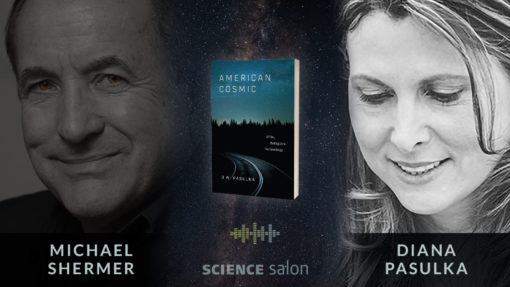
More than half of American adults and more than 75 percent of young Americans believe in intelligent extraterrestrial life. This level of belief rivals that of belief in God. In Science Salon # 105 Michael Shermer speaks with Diana Pasulka about her book: American Cosmic: UFOs, Religion, Technology.
How to Navigate Contentious Conversations
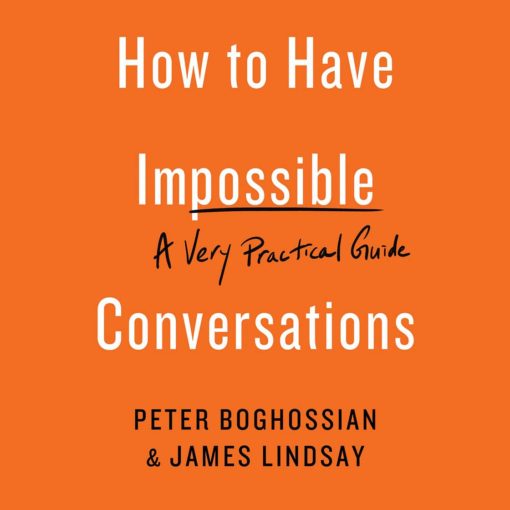
An excerpt from How to Have Impossible Conversations: A Very Practical Guide provides some tools to help people navigate contentious conversations.
eSkeptic for February 25, 2020
In Science Salon # 105 Michael Shermer speaks with Diana Pasulka about her book: American Cosmic: UFOs, Religion, Technology. PLUS an excerpt from How to Have Impossible Conversations: A Very Practical Guide provides some tools to help people navigate contentious conversations.
SKEPTIC App
Whether at home or on the go, the SKEPTIC App is the easiest way to read your favorite articles. Within the app, users can purchase the current issue and back issues. Download the app today and get a 30-day free trial subscription.










